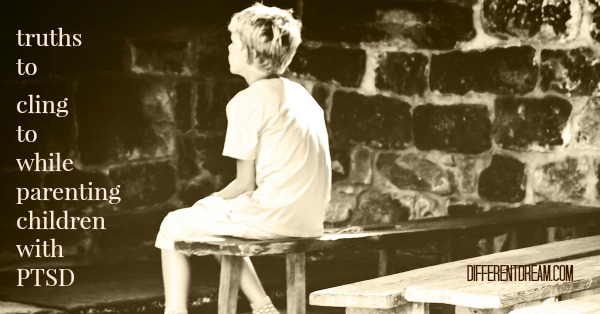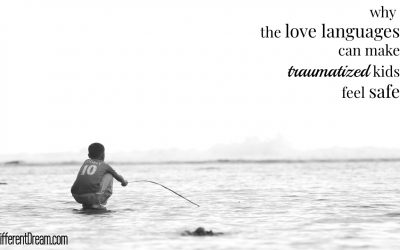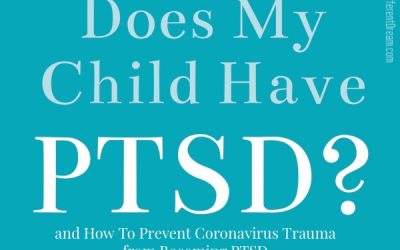Clinging to Faith while Parenting Children with PTSD

This post is the thirteenth and final article in this ongoing series about children with PTSD. Though the first ten articles in this series focused exclusively on PTSD in children, the final three address issues common to parents raising traumatized kids. Today’s post looks at six truths that can help parents cling to their faith when the challenges of raising children with PTSD seem overwhelming.
Truth #1: Christians’ understanding mental health lags far behind their understanding of physical health.
Before the age of modern medicine, physical illnesses were often viewed by the church as evidence of a lack of faith, the consequence of sin, or as punishment from God. In all those cases, the best remedy was confession and prayer. Medical advances have changed that thinking in regards to physical health. But not so much for mental health matters. The general public, as well as the Christian public, is woefully unaware of the many brain-imaging and stress hormone studies that show how trauma changes both the brains and bodies of children. They are also unaware of the many effective treatments for PTSD in children. As parents we can advocate for our kids by educating others about advances in mental health.
Truth #2: PTSD in children is not punishment for their sins or yours.
Children do not cause their own PTSD by sinning. And unless parents have neglected or abused their children, their sin does not cause PTSD in children either. But families can easily lose sight of this truth when parenting kids with PTSD. Parents begin blaming themselves or their kids. Blame can snowball into self-guilt for parents and casting guilt on children. We must continually remind ourselves, our spouses, and our kids that childhood PTSD is the result of trauma they did not seek or cause.
To read the rest of this post, visit the Key Ministry blog, Church4EveryChild.
Part 1: Writing About PTSD Was Not on My Bucket List
Part 2: Childhood Trauma by Any Other Name Is Still Traumatic
Part 3: 10 Myths about PTSD in Children
Part 4: What Causes PTSD in Children
Part 5: A Look Inside the Brain’s Response to Childhood Trauma
Part 6: Why the Spotlight Is on PTSD in Children
Part 7: Childhood PTSD Symptoms in Tots, Teens, and In Between
Part 8: Why and How Childhood PTSD Is often Misdiagnosed
Part 9: Effective Treatment of PTSD in Children
Part 10: How to Prevent PTSD in Traumatized Children
Part 11: How Parents Can Advocate Effectively for Traumatized Children
Part 12: 4 Reasons Traumatized Kids Need Mentally Healthy Parents
Part 13: Clinging to Faith While Parenting Children with PTSD
Do you like what you see at DifferentDream.com? You can receive more great content by subscribing to the quarterly Different Dream newsletter and signing up for the daily RSS feed delivered to your email inbox. You can sign up for the first in the pop up box and the second at the bottom of this page.
By Jolene
Jolene Philo is the author of the Different Dream series for parents of kids with special needs. She speaks at parenting and special needs conferences around the country. She’s also the creator and host of the Different Dream website. Sharing Love Abundantly With Special Needs Families: The 5 Love Languages® for Parents Raising Children with Disabilities, which she co-authored with Dr. Gary Chapman, was released in August of 2019 and is available at local bookstores, their bookstore website, and at Amazon.
Subscribe for Updates from Jolene
Related Posts
When Caregiving Sparks Stress Instead of Joy, What Can You Do?
When caregiving sparks stress instead of joy, what can you do? Jolene explains practical ways to find the blessings in hard situations.
Using the 5 Love Languages to Help Traumatized Kids
Using the 5 love languages to help traumatized kids makes sense. Whatever causes the trauma, these reasons show why the love languages help.
The Coronavirus, Trauma, and PTSD
The COVID-19 pandemic is causing uneasiness in many children. This post about the coronavirus, trauma, and PTSD explains how parents can tend to their kids’ mental health.






0 Comments